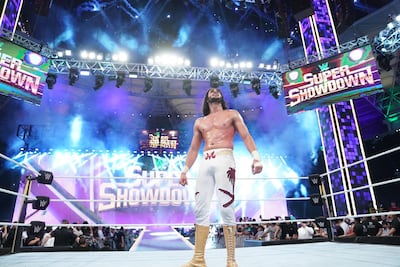Since he was a young boy, Mansoor Al Shehail wanted to get involved with World Wrestling Entertainment (WWE), but whether it would be as a wrestler, writer, manager or referee, he was unsure. He only knew he had to be a part of the wrestling scene.
Fast-forward to today and Al Shehail, 23, is the first Saudi-born wrestler to compete in the WWE; 18 months after his first appearance in a WWE ring, he's been signed on to the company's NXT brand, where he wrestles under his first name, Mansoor. While he's still viewed as a relative newcomer, Al Shehail is set to have quite the homecoming – in the form of a one-on-one singles match against Swiss wrestling superstar Cesaro at WWE's Crown Jewel event in Riyadh on Thursday, October 31. The last time Mansoor wrestled in Saudi, he won the Super Showdown 51-man battle royal.
"It feels amazing, but it's also sort of the same pressure I felt when I originally got picked to be a WWE superstar. It's like, 'Wow my dreams are coming true – this is the best feeling of my life', but there's also the pressure of expectations placed on my shoulders," he says. "It's a weight that I'm both happy with and struggling to bear because when I grew up wanting to be a WWE superstar, I never really thought of it under the context of being the first Saudi superstar, so that's a whole other historical weight that is added to the pressure."
The young wrestler has worked hard for this opportunity. While he was born in Saudi Arabia, he moved at a young age with his mother to the United States, where he honed his skills by training under WWE legend Dory Funk Jr. Even before he attended an open tryout with WWE in Jeddah, Al Shehail had previously worked as an independent wrestler for other smaller organisations in the US.
He’s grateful for the support he’s had from his family, even if they initially believed wrestling was more of a hobby than a full-blown career. Al Shehail admits there was a time when he, too, was unsure whether he’d ever get a chance to fulfil his dream. “There was something in the back of my mind telling me: ‘You’re not actually going to get to be a wrestler.’ I looked at myself, I looked at where I came from, there was no real precedent for people like me,” he explains.
However, that all changed after watching SummerSlam in 2013. In the wrestling company's annual marquee summer event, Daniel Bryan beat John Cena for the WWE Championship. Bryan, an underdog who was beloved by fans, won the title for a brief moment and that was enough to help the Saudi wrestler make his decision.
At Al Shehail’s big moment at the Super Showdown in Jeddah in June, seeing his family get to enjoy it up close made his victory all the sweeter. “When I won that match, I jumped into the arms of my older brother Talal, while my dad was raising my arm and jumping on his feet and laughing,” he says. “At these shows, he’s screaming and yelling and jumping up and down and cheering, and that’s amazing to see. It validates all the work I’ve put into this dream.”

Al Shehail now hopes to help inspire a new generation of wrestlers in the region, especially with Middle East wrestlers being few and far between. “I look very Arab, so it’s not like it’s something I can get away with by pretending I’m not [just] because I don’t want to be pigeonholed and shoehorned into a stereotypical role. I don’t blame people who play [Arab] characters – you have to put food on the table. It’s the same thing in movies, when Arab have to play terrorists. It’s nothing personal against people who have to perform that way. I’m just happy that now it doesn’t have to be that way.”
Al Shehail names fellow WWE wrestlers Sami Zayn (of Syrian heritage), Mojo Rawley (of Palestinian and Syrian heritage) and Ali (of Pakistani and Indian heritage) as inspirations for him when it came to staying true to his identity. “These guys paved the way for me. It’s like yes, I’m Arab, but that’s not the thing that defines me. It just happens to be something I’m proud of that’s a part of me,’” he says.
"When I'm wrestling in these NXT shows in Florida and on television, it makes me happy that people can see that I'm just like them," he adds. "That's the thing about wrestling that's so great – no matter where you go, no matter the cultural differences, wrestling is a universal language."


